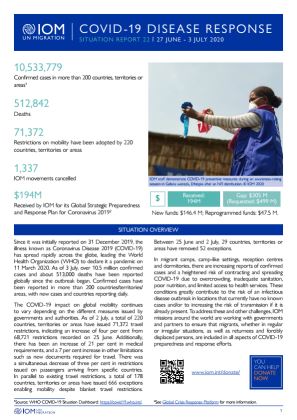-
Countries
-
Data and Analysis
-
Special Focus
-
Crisis Responses
IOM COVID 19 Response - Situation Report 22 (3 July 2020)

Contacto
COVID Response HQ - covid19ops@iom.int
Idioma
English
Ubicación
Global
Fecha de instantánea
Jun 27 2020
Jul 03 2020
Actividad
- Other
Since it was initially reported on 31 December 2019, the illness known as Coronavirus Disease 2019 (COVID-19) has spread rapidly across the globe, leading the World Health Organization (WHO) to declare it a pandemic on 11 March 2020. As of 3 July, over 10.5 million confirmed cases and about 513,000 deaths have been reported globally since the outbreak began. Confirmed cases have been reported in more than 200 countries/territories/areas, with new cases and countries reporting daily.
The COVID-19 impact on global mobility continues to vary depending on the different measures issued by governments and authorities. As of 2 July, a total of 220 countries, territories or areas have issued 71,372 travel restrictions, indicating an increase of four per cent from 68,721 restrictions recorded on 25 June. Additionally, there has been an increase of 21 per cent in medical requirements, and a 7 per cent increase in other limitations such as new documents required for travel. There was a simultaneous decrease of three per cent in restrictions issued on passengers arriving from specific countries. In parallel to existing travel restrictions, a total of 178 countries, territories or areas have issued 666 exceptions enabling mobility despite blanket travel restrictions. Between 25 June and 2 July, 29 countries, territories or areas have removed 52 exceptions.
In migrant camps, camp-like settings, reception centres and dormitories, there are increasing reports of confirmed cases and a heightened risk of contracting and spreading COVID-19 due to overcrowding, inadequate sanitation, poor nutrition, and limited access to health services. These conditions greatly contribute to the risk of an infectious disease outbreak in locations that currently have no known cases and/or to increasing the risk of transmission if it is already present. To address these and other challenges, IOM missions around the world are working with governments and partners to ensure that migrants, whether in regular or irregular situations, as well as returnees and forcibly displaced persons, are included in all aspects of COVID-19 preparedness and response efforts.
